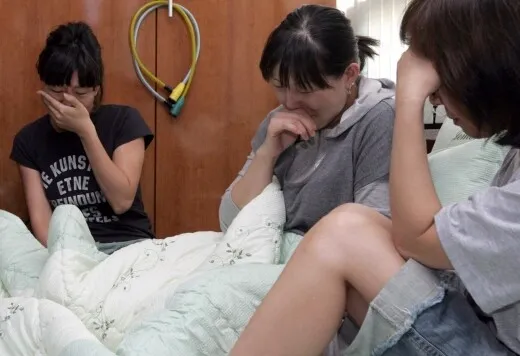hankyoreh
Links to other country sites 다른 나라 사이트 링크
Inter-Korean relations uncertain in wake of Imjin incident

The tenor of the South Korean government’s response to North Korea in regards to the disappearance and death of South Korean campers on the bank of the Imjin River has changed from “careful” to “hard-line” in just a day.
In a Unification Ministry statement Tuesday, the government referred to North Korea’s release of water from an upstream dam on the Imjin River as a “release of water without warning,” and is demanding a sufficient explanation and an apology from North Korean authorities responsible for the incident. Previously on Monday, the government issued a strong statement of regret, saying that the notice from North Korea regarding the necessity of the water release due to rising water levels at the Imjin dam was not persuasive and failed to make reference to the flood’s casualties. At that time, the government had not demanded an additional explanation or apology.
The government explained that its demand for an apology now follows North Korea’s first explanation provided the day before. It is saying there was an unavoidable time lag. Unification Ministry Spokesman Chun Hae-sung said the government asked for a sufficient explanation and apology for North Korea’s failure to give an explanation about rains in North Korea or mention the human losses. A government official said that it was necessary to first determine the reason for the water release, but after North Korea virtually admitted that it released the water without warning, the government then felt it needed to demand an apology.
The government’s demand for an apology is believed to be stemming from anger in South Korea over the serious causalities from the flood, with six missing or dead. In particular, it seems to have been made out of consideration of criticism coming mostly from the current government’s conservative base of support that the government’s inability to demand an apology from North Korea was problematic. On Tuesday morning, several conservative newspapers ran articles and editorials criticizing the South Korean government for not demanding an apology the day before. The Unification Ministry reportedly lengthened its Tuesday morning meeting by 30 minutes to discuss whether its demand for an apology should come in the form of a statement or a notification.
The South Korean government’s stance on discussions with North Korea to prepare an inter-Korean system to prevent a reoccurrence of the tragedy has also taken a step backwards, from active promotion to consideration. Spokesman Chun said Tuesday that he believed a system between the two countries was clearly needed to prevent a similar incident from recurring, but there are currently no plans for general or working-level talks. The government said Monday that it would push for an inter-Korean agreement, keeping in mind that North Korea has already said it will inform South Korea prior to releasing water from the dam in the future.
Observers are saying that given South Korea’s demand for an apology, it has put the ball in North Korea’s court. If North Korea provides a satisfactory explanation and expresses regret or remorse, it is possible the two sides will move into talks to prepare a mechanism to prevent a reoccurrence. It is possible, however, that North Korea will not respond to South Korea’s demands, and claim that no further explanation is needed. There is concern that in this case, inter-Korean relations, which have recently shown signs of improvement, could worsen. This could then become a situation similar to the shooting of the tourist at North Korea’s Mt. Kumgang, when the two sides failed to reach a breakthrough.
Please direct questions or comments to [englishhani@hani.co.kr]
Editorial・opinion
![[Editorial] Asia Future Forum brings bright minds together to explore democracy’s future [Editorial] Asia Future Forum brings bright minds together to explore democracy’s future](https://flexible.img.hani.co.kr/flexible/normal/500/300/imgdb/original/2025/1024/1317612945603513.jpg) [Editorial] Asia Future Forum brings bright minds together to explore democracy’s future
[Editorial] Asia Future Forum brings bright minds together to explore democracy’s future![[Column] Russia and China’s golden ticket to destabilizing the dollar [Column] Russia and China’s golden ticket to destabilizing the dollar](https://flexible.img.hani.co.kr/flexible/normal/500/300/imgdb/original/2025/1023/2117612083961121.jpg) [Column] Russia and China’s golden ticket to destabilizing the dollar
[Column] Russia and China’s golden ticket to destabilizing the dollar- [Correspondent’s column] Martial law comes for the United States
- [Column] The end of the road for NewJeans, or a new beginning?
- [Editorial] Korea must prepare for rough road ahead with Japan
- [Editorial] Korea cannot afford to rush to a deal with the US
- [Column] Shared dilemmas at a historic turning point for Korea, Europe
- [Column] Halfway across the world, I’m cheering on Americans fighting for democracy
- [Column] How meritocracy turns into tyranny
- [Column] The real scandal of Korea’s ‘divorce of the century’
Most viewed articles
- 1Korea allows same-sex couples to check ‘spouse’ box on census for first time
- 2Record visitors bring National Museum of Korea into world top 5 art museum territory
- 3Real-life heroes of “A Taxi Driver” pass away without having reunited
- 4Lee says US tariff deal may not be finalized by next week’s APEC summit
- 5Despite stellar performance, BTS leaves Grammys empty-handed again
- 6North Korea asserts its presence before Trump arrives in South Korea
- 7Korea’s response to martial law crisis a model of 3 strategies for defending democracy, says Levitsk
- 8Korea, US will soon start negotiations on revising nuclear energy pact, says FM
- 9[Correspondent’s column] Martial law comes for the United States
- 10[Photo] Incheon Inner Harbor silo reborn as mural